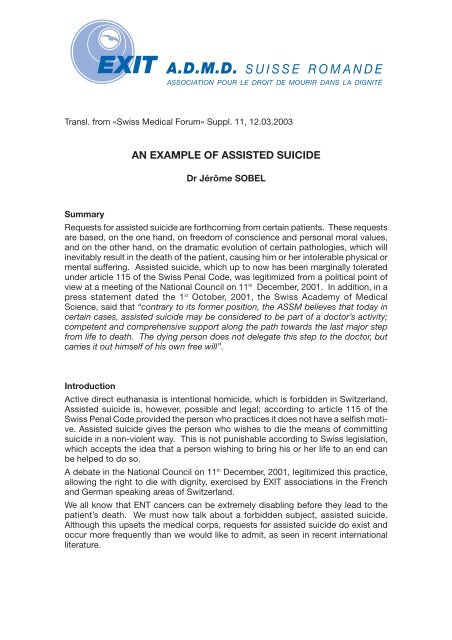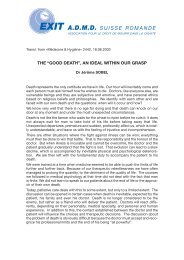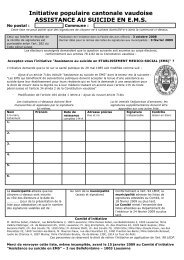Exit - Example Ass. sui. (A) - Association EXIT Suisse romande
Exit - Example Ass. sui. (A) - Association EXIT Suisse romande
Exit - Example Ass. sui. (A) - Association EXIT Suisse romande
You also want an ePaper? Increase the reach of your titles
YUMPU automatically turns print PDFs into web optimized ePapers that Google loves.
<strong>EXIT</strong> A.D.M.D. SUISSE ROMANDE<br />
ASSOCIATION POUR LE DROIT DE MOURIR DANS LA DIGNITÉ<br />
Transl. from «Swiss Medical Forum» Suppl. 11, 12.03.2003<br />
AN EXAMPLE OF ASSISTED SUICIDE<br />
Dr Jérôme SOBEL<br />
Summary<br />
Requests for assisted <strong>sui</strong>cide are forthcoming from certain patients. These requests<br />
are based, on the one hand, on freedom of conscience and personal moral values,<br />
and on the other hand, on the dramatic evolution of certain pathologies, which will<br />
inevitably result in the death of the patient, causing him or her intolerable physical or<br />
mental suffering. <strong>Ass</strong>isted <strong>sui</strong>cide, which up to now has been marginally tolerated<br />
under article 115 of the Swiss Penal Code, was legitimized from a political point of<br />
view at a meeting of the National Council on 11th December, 2001. In addition, in a<br />
press statement dated the 1st October, 2001, the Swiss Academy of Medical<br />
Science, said that “contrary to its former position, the ASSM believes that today in<br />
certain cases, assisted <strong>sui</strong>cide may be considered to be part of a doctor’s activity;<br />
competent and comprehensive support along the path towards the last major step<br />
from life to death. The dying person does not delegate this step to the doctor, but<br />
carries it out himself of his own free will”.<br />
Introduction<br />
Active direct euthanasia is intentional homicide, which is forbidden in Switzerland.<br />
<strong>Ass</strong>isted <strong>sui</strong>cide is, however, possible and legal; according to article 115 of the<br />
Swiss Penal Code provided the person who practices it does not have a selfish motive.<br />
<strong>Ass</strong>isted <strong>sui</strong>cide gives the person who wishes to die the means of committing<br />
<strong>sui</strong>cide in a non-violent way. This is not punishable according to Swiss legislation,<br />
which accepts the idea that a person wishing to bring his or her life to an end can<br />
be helped to do so.<br />
A debate in the National Council on 11th December, 2001, legitimized this practice,<br />
allowing the right to die with dignity, exercised by <strong>EXIT</strong> associations in the French<br />
and German speaking areas of Switzerland.<br />
We all know that ENT cancers can be extremely disabling before they lead to the<br />
patient’s death. We must now talk about a forbidden subject, assisted <strong>sui</strong>cide.<br />
Although this upsets the medical corps, requests for assisted <strong>sui</strong>cide do exist and<br />
occur more frequently than we would like to admit, as seen in recent international<br />
literature.
Society is undergoing great changes and individual moral values are evolving<br />
beyond religious dogma. Morals are becoming pluralistic and personal freedom<br />
must not infringe upon the freedom of others. People must have mutual respect for<br />
the personal development, dignity, freedom and even end-of-life choices of others.<br />
The right to life remains fundamental: the right to choose to die appears to be just<br />
as fundamental. The right to die when desired has particular significance: it is the<br />
request for death by the individual concerned, who can help, assist and organize his<br />
own death.<br />
Presentation of a case<br />
The case is of a man born in 1960 who was suffering from leiomyosarcoma of the<br />
left maxillary sinus with tumoral invasion of the superior hemimaxillary, of the orbit<br />
and the pterygomaxillary fossa.<br />
The patient was admitted to the CHUV and on the 13th of September, 1999 he underwent<br />
the following surgical treatment:<br />
– Tracheotomy<br />
– Left cervical exploration highlighting vascular axes<br />
– Submaxillectomy<br />
– Tumorectomy by paranasal, translabial and transmaxillary means<br />
– Left superior hemimaxillectomy<br />
– Orbitary exenteration<br />
– Evidement of pterygomaxillary fossa<br />
– Left ethmoidectomy<br />
– Reconstruction of defect by microanastomosis flap of the abdominal muscle<br />
wall<br />
– Arterial and venous microanastomosis<br />
– Thiersch’s graft<br />
On the 11th October, 1999 a cytopuncture showed up a precocius post operative left<br />
jugal recurrence. Another surgical intervention was suggested to the patient but he<br />
refused preferring palliative care.<br />
On 21st October, 1999, he contacted <strong>EXIT</strong> and formally requested assisted <strong>sui</strong>cide.<br />
This request was accepted following a meeting, and after a long discussion in the<br />
presence of his wife.<br />
On 6th November, 1999 I went to the patient’s home. He was waiting for me and<br />
introduced me to his parents. His sister, who had come from Great Britain, and his<br />
brother-in-law, from the United States, were both present. After a final discussion, I<br />
gave the patient a lethal liquid solution that he administered himself by means of a<br />
gastrostomy probe. He went to sleep rapidly and I certified his death 45 minutes<br />
later. I informed the judicial police of his death and they commenced an enquiry at<br />
the request of the examining magistrate. The judge requested an external examination<br />
of the patient’s body by the medical- legal institute. The investigation was proceeded<br />
with, but was then discontinued by the legal authorities in Vaud as there<br />
were no grounds for prosecution, based on an examination of the situation, the written<br />
request of the patient and the medical diagnosis of the case.
Commentary<br />
I agreed to assist this patient in his <strong>sui</strong>cide because he chose to die in dignity with<br />
full knowledge and lucidity, while fulfilling the 5 conditions for assisted <strong>sui</strong>cide:<br />
• discernment<br />
• repeated serious request<br />
• incurable illness<br />
• intolerable physical or psychological suffering<br />
• terminal prognosis or serious disability (in cases of non -oncological pathology).<br />
It is the patient alone who must decide if the quality of the life left to him is bearable<br />
or not; it is he who is going to die and not the doctor or the persons caring for him.<br />
This means that the patient making the request must be informed of his condition.<br />
The right to die with dignity and to request assisted <strong>sui</strong>cide goes hand in hand with<br />
the right to know the truth. In such cases nobody has the right to impose his own<br />
rules on another person. Everyone’s beliefs must be respected and the choice of<br />
each person must be respected, because assisted <strong>sui</strong>cide is possible in<br />
Switzerland.<br />
Legal situation<br />
Article 115 of the Swiss Penal Code<br />
Article 115 of the Swiss Penal Code dealing with cases of inciting and assisting <strong>sui</strong>cides<br />
stipulates that: “Anyone with a selfish motive who incites a person to commit<br />
<strong>sui</strong>cide or who helps that person to commit <strong>sui</strong>cide, if that <strong>sui</strong>cide is consummated<br />
or attempted, will be punished by a maximum of 5 years reclusion or imprisonment”.<br />
If there is no selfish motive, a group of federal experts have confirmed that assisted<br />
<strong>sui</strong>cide is, in such cases, legal and is, therefore, not punishable. As <strong>sui</strong>cide is not<br />
punishable in the Penal Code, why should assisted <strong>sui</strong>cide with no selfish motive be<br />
punishable?<br />
Why is there a problem nowadays?<br />
Palliative care is often proposed instead of assisted <strong>sui</strong>cide. However, despite<br />
immense progress, palliative care does not always offer an adequate solution to<br />
people’s suffering. The existence of such a possibility should not deprive a person,<br />
capable of discernment, of his right to request assisted <strong>sui</strong>cide.<br />
According to the evidence of several international medical studies, palliative care is<br />
not always sufficient to stop either diverse physical suffering or psychological suffering<br />
which can be even more intense than physical suffering when well treated. The<br />
patient remembers how he used to be, and can see what he has become. He can<br />
ask himself what further deterioration he will have to undergo before death intervenes.<br />
Certain patients prefer assisted <strong>sui</strong>cide to any kind of palliative care, particularly<br />
the use of strong sedation, which would lead to loss of personality and selfdetermination.<br />
Good palliative care and accessibility of requests for assisted <strong>sui</strong>cide<br />
should not be in opposition to each other but should be complementary. The<br />
patient should be allowed to choose freely as he alone has the necessary criteria to<br />
determine if the quality of the remainder of his life is satisfactory or not.
Following the National Council debate on 11 th December, 2001 regarding active<br />
direct euthanasia and assisted <strong>sui</strong>cide, the Swiss Academy of Medical Science<br />
opposed active euthanasia. However, contrary to its former position, the ASSM<br />
today considers that, in certain cases, assisted <strong>sui</strong>cide can be seen as being part of<br />
a doctor’s activity: competent, comprehensive support along the path towards the<br />
last major step from life to death. The dying person does not delegate this step to<br />
the doctor but carries it out himself, of his own free will.<br />
Conclusions<br />
The right to die with dignity and to request assisted <strong>sui</strong>cide is the fundamental right<br />
of the individual, one that should be more freely accessible in the future because it<br />
is a legal right. The matter in question here is no longer the doctor and his deontological<br />
code, but the patient and his rights, and the means the patient has to ensure<br />
that these rights are respected.<br />
Dr Jérôme Sobel<br />
President of <strong>EXIT</strong> ADMD <strong>Suisse</strong> <strong>romande</strong>




